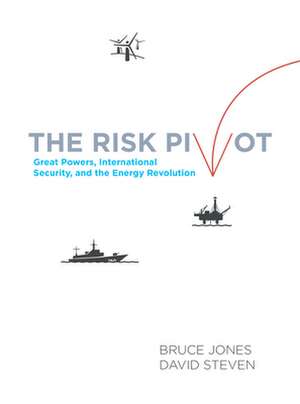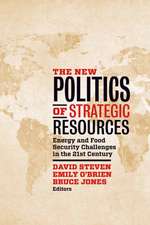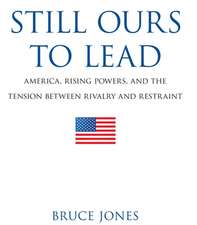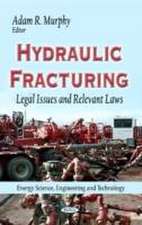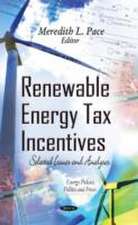The Risk Pivot: Great Powers, International Security, and the Energy Revolution
Autor Bruce D. Jones, David Stevenen Limba Engleză Paperback – 21 noi 2014
The last decade has seen a revolution in global energy. First, we saw explosive growth in demand from Asia's rising powers, which fueled fears about scarcity and conflict. But we've also seen an American revolution in technology and markets, resulting in a dramatic increase in sup-ply. This is strengthening America's hand in the world—but it's not without complications. There are major security consequences of these shifts. Among the most consequential are China and India, Asia's emerging giants, which are increasingly exposed to political risks associated with energy risks, as well as the energy flows, pivoting to Asia. Meanwhile the great powers struggle to balance their need for fossil fuels with a mounting effort to tackle climate change. The top powers, and the United States above all, face a stra-tegic choice: whether to use energy as a weapon of geopolitics, or as a tool of a stable order.
CONTENTS
Introduction
1. The President and the King—Key Messages of the Book
2. The Energy Revolutions—A Primer
Geopolitics in Flux—The Players
3. Choices—Scenarios, and the Choice the Powers Confront
4. Rough Seas Ahead—The Great Powers' Search for Energy Security
Globalization and Complexity—The Problems
5. Transition in the Gulf
6. The Turbulent Middle
7. Fragile States
8. The Russian Problem
9. Connections—from Pipelines to Politics
Governance—The Partners
10. An Emerging System of Global Energy Governance
11. Leadership Choices
CONTENTS
Introduction
1. The President and the King—Key Messages of the Book
2. The Energy Revolutions—A Primer
Geopolitics in Flux—The Players
3. Choices—Scenarios, and the Choice the Powers Confront
4. Rough Seas Ahead—The Great Powers' Search for Energy Security
Globalization and Complexity—The Problems
5. Transition in the Gulf
6. The Turbulent Middle
7. Fragile States
8. The Russian Problem
9. Connections—from Pipelines to Politics
Governance—The Partners
10. An Emerging System of Global Energy Governance
11. Leadership Choices
Preț: 197.97 lei
Nou
Puncte Express: 297
Preț estimativ în valută:
37.89€ • 41.14$ • 31.82£
37.89€ • 41.14$ • 31.82£
Carte tipărită la comandă
Livrare economică 22 aprilie-06 mai
Preluare comenzi: 021 569.72.76
Specificații
ISBN-13: 9780815726043
ISBN-10: 081572604X
Pagini: 206
Dimensiuni: 152 x 229 x 13 mm
Greutate: 0.32 kg
Editura: Brookings Institution Press
Colecția Brookings Institution Press
ISBN-10: 081572604X
Pagini: 206
Dimensiuni: 152 x 229 x 13 mm
Greutate: 0.32 kg
Editura: Brookings Institution Press
Colecția Brookings Institution Press
Notă biografică
David Steven is a nonresident senior fellow in the Foreign Policy program at Brookings, where he works with the International Order and Strategy project. Bruce Jones is a deputy director of the Foreign Policy program at Brookings, where he also directs the International Order and Strategy project; he has past experience with the United Nations, the World Bank and in intergovernmental negotiations on security and transnational threats.
Descriere
The last decade has seen a revolution in global energy. First, we saw explosive growth in demand from Asia's rising powers, which fueled fears about scarcity and conflict. But we've also seen an American revolution in technology and markets, resulting in a dramatic increase in sup-ply. This is strengthening America's hand in the world—but it's not without complications. There are major security consequences of these shifts. Among the most consequential are China and India, Asia's emerging giants, which are increasingly exposed to political risks associated with energy risks, as well as the energy flows, pivoting to Asia. Meanwhile the great powers struggle to balance their need for fossil fuels with a mounting effort to tackle climate change. The top powers, and the United States above all, face a stra-tegic choice: whether to use energy as a weapon of geopolitics, or as a tool of a stable order.
CONTENTS
Introduction
1. The President and the King—Key Messages of the Book
2. The Energy Revolutions—A Primer
Geopolitics in Flux—The Players
3. Choices—Scenarios, and the Choice the Powers Confront
4. Rough Seas Ahead—The Great Powers' Search for Energy Security
Globalization and Complexity—The Problems
5. Transition in the Gulf
6. The Turbulent Middle
7. Fragile States
8. The Russian Problem
9. Connections—from Pipelines to Politics
Governance—The Partners
10. An Emerging System of Global Energy Governance
11. Leadership Choices
CONTENTS
Introduction
1. The President and the King—Key Messages of the Book
2. The Energy Revolutions—A Primer
Geopolitics in Flux—The Players
3. Choices—Scenarios, and the Choice the Powers Confront
4. Rough Seas Ahead—The Great Powers' Search for Energy Security
Globalization and Complexity—The Problems
5. Transition in the Gulf
6. The Turbulent Middle
7. Fragile States
8. The Russian Problem
9. Connections—from Pipelines to Politics
Governance—The Partners
10. An Emerging System of Global Energy Governance
11. Leadership Choices
